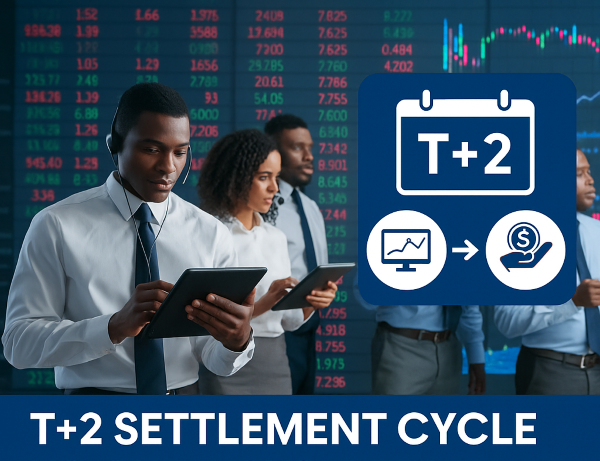T+2 Settlement Cycle to Cut Risks, Deepen Investor Confidence — SEC

The Securities and Exchange Commission (SEC) has announced that Nigeria’s transition to a T+2 settlement cycle will boost market efficiency, reduce trading risks, and enhance investor confidence in the nation’s capital market.
Under the T+2 system, securities transactions will be fully settled two business days after trade execution, ensuring faster delivery and payment between buyers and sellers. For example, a stock purchased on Monday would be completely settled by Wednesday.
Speaking at a stakeholder roundtable on “Ensuring Readiness for T+2 Settlement” in Abuja, SEC Director-General, Dr. Emomotimi Agama, described the move as “a milestone reform that will make the Nigerian market more competitive and resilient.”
“A shorter settlement cycle is a hallmark of a mature and dynamic market,” Agama said.
“It reduces counterparty risks, strengthens liquidity by returning capital faster to investors, and aligns Nigeria with international best practices.”
Agama explained that by shortening the time between trade execution and final settlement, the T+2 framework would minimise exposure to defaults and enhance overall market stability.
He added that faster settlement promotes reinvestment, encourages higher trading volumes, and positions Nigeria as a stronger player in the global financial arena.
“This initiative directly reduces market exposure, boosts investor confidence, and aligns our market structure with advanced economies,” he said.
“While many global markets are moving toward T+1 settlements, Nigeria must continue evolving to remain globally relevant.”
The SEC boss urged capital market stakeholders to collaborate in identifying bottlenecks, sharing best practices, and developing a clear roadmap for smooth implementation.
Agama reaffirmed the Commission’s commitment to providing regulatory support and technical guidance, describing the T+2 migration as “a proud milestone in Nigeria’s journey toward a more efficient, transparent, and investor-friendly market.”
T+2 is the settlement cycle where the completion of a securities trade, including the transfer of ownership and payment, occurs two business days after the trade is executed. For example, a trade executed on Monday (Trade Day) will be settled by Wednesday (Trade Day + 2 Business Days).
Here’s how it works:
Trade Day (T): A trade is carried out (e.g., an investor buys shares on Monday).
Settlement Day (T+2): The transaction is completed – cash is exchanged, and securities are delivered by the second business day after the trade (in this case, Wednesday).
Rationale for reducing the settlement cycle
Nigeria is adopting the T+2 settlement cycle to:
- Align with global standards: Major financial markets already use a T+2 or faster cycle for settlement of capital market transactions.
- Improve market liquidity: Faster settlement reduces counterparty risk and frees up capital quicker for reinvestment.
- Enhance investor confidence: A shorter cycle minimizes price fluctuations and uncertainties between trade and settlement, thus boosting investor confidence.
- Boost competitiveness: Attracts more foreign and domestic investors by meeting international standards and increasing operational efficiency.
Key Benefits for Investors
The transition to T+2 settlement brings significant advantages to all players in Nigeria’s capital markets—enhancing efficiency, reducing risks, and improving overall market confidence. Below are the key benefits for different market participants:
- Get funds/securities 1 day faster
- Less risk of price changes before settlement
- Easier reinvestment with quicker access to cash












